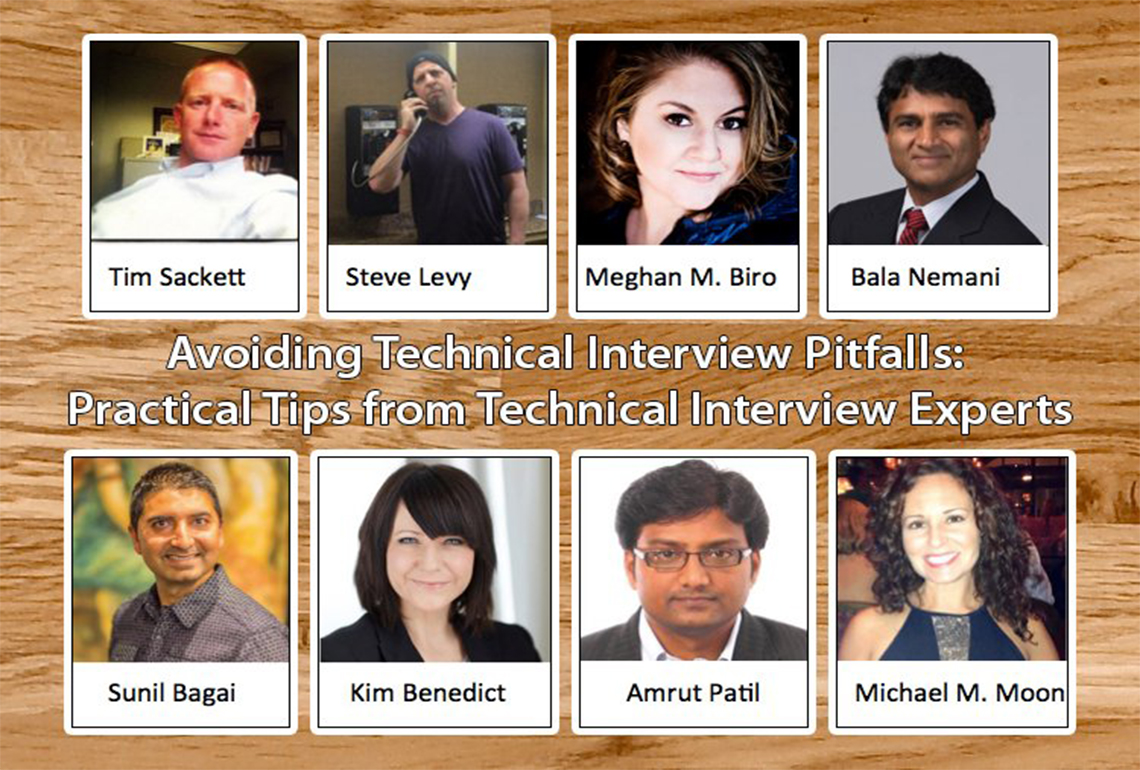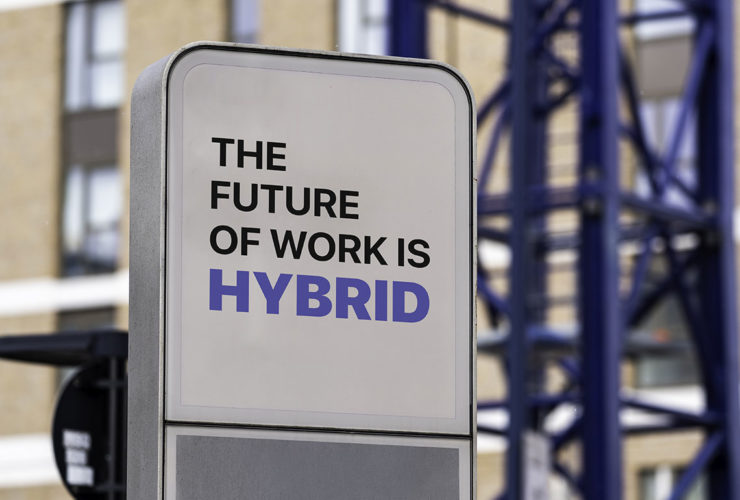There are good interview practices and there are bad interview practices – both on the part of the interviewer and interviewee. Bad practices lead to bad hires and missed job opportunities. Here at eTeki, we don’t want that to happen. We want you, the interviewer, to get the candidate you need and you, the candidate, to get the job you want.
To help point out some of the dos and don’ts of technical interviews, from both the candidate’s perspective and the hiring manager, we asked eight tech-recruiting experts the following two questions:
- What are the most common mistakes candidates make during technical interviews?
- What are the most common mistakes hiring managers (or recruiters) make during technical interviews?
Our panel included:

Their answers are below:
What are the most common mistakes candidates make during technical interviews?
During technical interviews many candidates struggle to give specific examples of how they’ve used the skills they’re being interviewed about. Also, many will give broad answers about projects they’ve worked on, but not specifics about what their role was on those projects. This is the time to get into the weeds, during the technical interview, and show your actual skills.
Tim Sackett, SPHR, SCP
President, HRU Technical Resources http://hru-tech.com/
https://twitter.com/TimSackett
Not drawing a picture of the overall software architecture, then drilling down in greater detail into where they work while talking about the stack, problems, barriers, deliverables, etc. That picture demonstrates that you can articulate what you really do. Being able to code is great but being able to communicate what you do to those on your and other teams really separates you from those who can’t.
Steve Levy
Recruiting Inferno Consulting https://recruitinginferno.com/
https://twitter.com/levyrecruits
Tech candidates may not be presenting themselves in their best light. In some cases, they may not have to: it’s such a tight market. In other cases, they don’t necessarily know what they need to walk in with. But here are the areas that could be covered better:
- Know how to tell your own story, and fast. I mean present an organized picture of yourself, including about how you acquired and mastered the skills you have — and what skills those are, but also how you problem solve, how you learn.
- Understand how you work with others. You’re not a solitary, disconnected entity: you’re being hired to work with teams. Be sure to have something to say about that. How do you collaborate? How do you communicate?
- Be clear with the specs and requirements of the job itself. Don’t be afraid to ask the hard questions. This is one field where candidates run the show: there’s incredible demand and it’s growing every day. Don’t skimp on knowing what you’re about to get into. It’s not arrogant to ask about salary and requirements and benefits. It shows, too, that you know you’re getting hired into an organization.
- Be ready to show your chops. Before the interview, bone up. Walk in ready to go for it. Experienced candidates will know this: they’re used to the drill. But newer candidates may not: you’ll be asked to show your skills. So make sure you’re clear-headed, and familiar with the tools they want you to work with. Try to get a sense of what you’ll be asked to do before you go in. And then you can prepare.
Meghan M. Biro
CEO, TalentCulture #WorkTrends http://www.talentculture.com
https://twitter.com/MeghanMBiro
Not asking enough questions about project, role, team, culture and company. It helps a great deal to do the research in learning about company, culture and job/role etc. before meeting.
Bala Nemani
Founder & CEO, Amzur Technologies, Inc. http://www.amzur.com and eTeki, Inc.
https://linkedin.com/in/balanemani
Making the mistake of thinking they need to memorize technologies, tools and frameworks so they can answer questions about them, but really they need to come prepared to show how they help solve critical problems through collaboration and a clear and repeatable process.
Sunil Bagai
Founder & CEO, Crowdstaffing http://crowdstaffing.com and ZenithTalent http://www.zenithtalent.com
https://twitter.com/bagaisunil
When your skill set isn’t a perfect match for a position, it’s important to tell recruiters about your related skills. For instance, if you’re familiar with C, it’s relatively easy to learn C++. Technical recruiters are able to see that link, and may move you forward based on your previous experience and ability to pick up the new language.
Kim Benedict
CEO & Co-Founder, TalentMinded Inc. http://www.talentminded.ca
https://twitter.com/kimbenedict44
A common mistake made by candidates is not telling the truth about their correct role in a current project. When this actually comes out during the detailed interview it looks bad for the candidate. One more mistake is taking the 10ft view of their current project before the interview. Where this project exactly fits in company strategy/vision will actually help in explaining about their work to interviewers. They have to do a good job at selling themselves to the interviewers. Knowing about their project work in detail and its benefits definitely goes a long way.
Amrut Patil
eTeki Technology Advisory Panel – Mobility
https://www.linkedin.com/in/patil-amrut
A common mistake candidates make during technical interviews is being unprepared to discuss all the skills and technology that are listed on their resumes or in the job description. In preparation for an interview, candidates should review previous technical projects they have worked on, especially those explicitly listed on their resumes, and be prepared to talk about them. Additionally, when answering specific coding questions many interviewees don’t take the time fully understand the question and/or do not carefully read the requirements. Take your time, ask for clarification and don’t ignore information/instructions given. In many cases, they are there for a very specific reason.
Ms. Michael M. Moon, PhD
CEO and Principal Analyst, ExcelHRate Research & Advisory Services http://www.excelhrate.com
Principal Consultant, MMM & Associates http://www.michaelmoonhcm.com
https://twitter.com/mikemmoon
What are the most common mistakes hiring managers (or recruiters) make during technical interviews?
Most interviewers fail to ask the question that’s in their head during a technical interview. “Well, that didn’t sound quite right? Can you give me more specifics around such and such?” Instead they let it go, not wanting to seem pushy, but in the end not hiring the candidate because they didn’t answer that question very well. Interviewers need to be that jealous boyfriend and girlfriend and dig into every little piece of the answer that doesn’t make sense. Also, many interviewers fail to recognize how the candidate’s skills, which may be different than what you exactly need, will fit into the needs of the company. “Well, they say said they are super strong in front-end development and I really need back-end.” Well, did you ask them specifically about their back-end experience?
Tim Sackett, SPHR, SCP
President, HRU Technical Resources http://hru-tech.com/
https://twitter.com/TimSackett
Not understanding the true deliverables of the position and associated career paths. Hiring Managers: The disease of perfectionism – without rank ordering what you really need in a person who will be successful in the role, you cannot accurately or effectively assess a person. You end up “feeling” rather than “thinking” and making decisions based upon everything but performance.
Steve Levy
Recruiting Inferno Consulting https://recruitinginferno.com/
https://twitter.com/levyrecruits
I’m going to talk about the human side of this. There are a few habits I see that all add up to possible hiring mistakes:
- The like attracts like syndrome. Perfectly natural: When someone reminds us of ourselves we naturally gravitate toward them then ease off on the hard questions. There’s an unconscious bias there, to be sure, but many hiring managers are already well trained to overlook it. But unconscious familiarity is something else. So stick to the script. Have a list of questions and don’t gloss. And don’t let that familiarity keep you from digging in. If you’re not getting a clear answer on something, find out more.
- The “we need you more than you need us” syndrome. Because the big organizations tend to be really big, and really well-funded, there’s so much of an underdog mentality in smaller firms. And this is a really candidate driven market. But don’t compromise. Go for the best candidates. Again, no assumptions here: don’t assume that you’ll get passed up for a fancier package. Tech is about growth and innovation, and a smaller-scale means there may be more room to do that. Share the story of the firm. (I’m big on employer brand for a reason: it’s an imperative now.) Demonstrate you want someone by moving fast. Schedule an interview quickly and don’t mull it over too much. That shows commitment and may just add to your appeal.
- The mechanics are everything problem. We’re not robots or AI or just a series of codes. So make sure there’s room in the interview for getting a sense of just how the candidate solves problems and faces challenges. Can they think on their feet? Get the subject of adversity going, even if it’s not in a tech gig (some of these kids are young and fresh out of nowhere). How do they tackle problems that come up? Walk through a potential issue. It might be good to prepare yourself with a known scenario from the firm you’re hiring for and see what, if anything, the candidate would bring to that situation. This will also give you a sense of how they communicate, which is important.
Meghan M. Biro
CEO, TalentCulture #WorkTrends http://www.talentculture.com
https://twitter.com/MeghanMBiro
Asking questions from Google Search and trying to qualify a candidate for a job. Interviews should be conversational in understanding the job and candidate’s experience. Review practical scenarios and how they have been addressed.
Bala Nemani
Founder & CEO, Amzur Technologies, Inc. http://www.amzur.com and eTeki, Inc.
https://twitter.com/balanemani
A common mistake hiring managers make during a technical interview is when they focus solely on technical aptitude instead of on the process used to come up with solutions.
Sunil Bagai
Founder & CEO, Crowd staffing http://crowdstaffing.com and Zenith Talent http://www.zenithtalent.com
https://twitter.com/bagaisunil
The biggest mistake recruiters make in technical interviews is not being educated on the field and position they’re hiring for. You may miss out on a great candidate if you can’t see the links between fields. For example: a QA analyst may be an excellent automation specialist if they have experience in automated testing.
Kim Benedict
CEO & Co-Founder, TalentMinded Inc. http://www.talentminded.ca
https://twitter.com/kimbenedict44
More emphasis on knowing actual code/language rather than on evaluating the person on their logical reasoning and foundation of technical understanding. Once you have the basics right you can learn any language you want easily.
Amrut Patil
eTeki Technology Advisory Panel – Mobility
https://www.linkedin.com/in/patil-amrut
The primary mistake that hiring managers make when interviewing for technical roles is over-valuing current skills and under-valuing future impact and subsequently a candidate’s ability to grow. Recruiters and hiring managers shouldn’t be hiring employees solely based on what they already know, rather they should be thinking about the candidate’s ability to learn new skills. Would you want to hire someone because they can do exactly the thing you need them to do today? Which I guarantee is a smaller pull of candidates. Or do you want to hire a group of people who are smart enough to be good at that job and who can adapt and grow to a company’s changing needs?
Additionally, when too much emphasis is placed on technical white boarding – a technique used to give candidates a chance to demonstrate their technical knowledge when presented with a coding problem – other important attributes are often under-valued or even ignored. While certainly important, coding skills are not always the most important skills that a software developer needs. And in many cases, perfectly good candidates may slip through the cracks because they simply do not test well under pressure. As an alternative or supplement, consider giving a candidate a piece of code and asking them to review it. What do they think it does? What do they like about the code? What might they do differently? Even more importantly, hiring managers must also be willing give more weight to things like communication style, personality, prior experience, and cultural fit in the selection process. When technical attributes are prioritized above all others, the result is a homogeneous, similarly-skilled team of employees who may or may not actually be able to perform their jobs.
Ms. Michael M. Moon, PhD
CEO and Principal Analyst, ExcelHRate Research & Advisory Services http://www.excelhrate.com
Principal Consultant, MMM & Associates http://www.michaelmoonhcm.com
https://twitter.com/mikemmoon
Do you have any technical interviewing tips? If so, go to the comments section of this blog and enter them. We would love to hear them.







